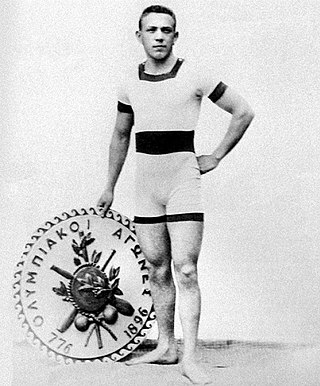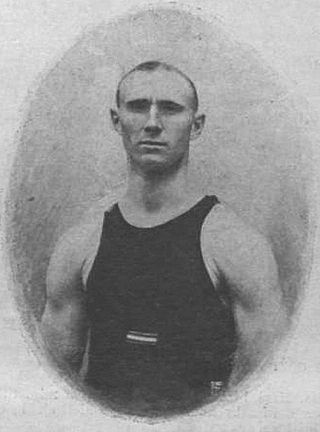
Alfréd Hajós was a Hungarian swimmer, football (soccer) player, referee, manager, and career architect. He was the first modern Olympic swimming champion and the first Olympic champion of Hungary. Formerly excelling in track including discus and hurdles, he was part of the first National European football/soccer team fielded by Hungary in 1902, later serving as a referee as well as the manager and coach of the national football team.
At the 1904 Summer Olympics, nine swimming events were contested. The 1904 swimming competition was the only time in Olympic history that racing distances were measured in yards. The competition was held September 4–6, 1904. There was a total of 32 participants from 5 countries competing. The 10 events at the swimming competitions were held at a man-made lake that was used for life-saving exhibitions by the coast guard.
At the 1908 Summer Olympics in London, six swimming events were contested. These were the first Olympic Games in which a 100-metre pool had been especially constructed. Previous Olympic events were swum in open water. Only men participated in the swimming events. The competitions were held from Monday, July 13, 1908, to Saturday, July 25, 1908.
József Nagy was a Hungarian athlete. He was born Sárkeresztúr and competed at the 1908 Summer Olympics in London.
Frigyes Mezei was a Hungarian athlete. He competed at the 1908 Summer Olympics in London and at the 1912 Summer Olympics in Stockholm.

Zoltán Imre Ödön Halmay de Erdőtelek was a Hungarian Olympic swimmer. He competed in four Olympics, winning the following medals:

The men's 100 metre freestyle was one of six swimming events on the swimming at the 1908 Summer Olympics programme. It was the shortest of the three individual freestyle events, as the 50 yard freestyle had been dropped after its one appearance on the 1904 Summer Olympics programme. The 100 metre event was contested for the third time after it had been held at the 1896 and 1906 Olympics. The 1904 Olympics saw a 100-yard event. The competition was held on Friday 17 July 1908 and Monday 20 July 1908. Thirty-four swimmers from twelve nations competed. Each nation was limited to 12 swimmers.
John Johansen was a Norwegian sprinter.
Otto Scheff, born Otto Sochaczewsky was an Austrian freestyle swimmer, water polo player, lawyer, politician, and sports official who competed in the 1906 Intercalated Games, in the 1908 Summer Olympics, and in the 1912 Summer Olympics.

Robert Theodor Andersson was a Swedish water polo player, diver, and freestyle swimmer who competed in the 1906 Summer Olympics, in the 1908 Summer Olympics, in the 1912 Summer Olympics, and in the 1920 Summer Olympics.
Harald Robert Severin Klem was a Danish gymnast and swimmer who competed in the 1906 Intercalated Games and in the 1908 Summer Olympics.
William Foster was an English competitive swimmer who represented Great Britain in the 1908 and 1912 Olympics. He was freestyle swimmer who won gold and bronze medals as a member of British relay teams and set a world record in the 4x200-metre freestyle relay.
Hans Peter Ludvig Dam was a Danish freestyle and backstroke swimmer who competed in the 1906 Summer Olympics and 1908 Summer Olympics.
József Munk was a Hungarian freestyle swimmer who competed at the 1908 Summer Olympics. He was Jewish, and in 1942 he fell into the hands of the Soviets. He was taken as a prisoner to the Soviet Union, from where he never returned.
Béla Las-Torres was a Hungarian freestyle swimmer who competed at the 1908 Summer Olympics and 1912 Summer Olympics.

Henrik Hajós was a Hungarian freestyle swimmer who competed in the 1906 Intercalated Games and the 1908 Summer Olympics. He was born and died in Budapest and was the younger brother of Alfréd Hajós.

Richard Max Ritter was a German freestyle and backstroke swimmer who competed in the 1908 Summer Olympics and in the 1912 Summer Olympics.
Mario Massa was an Italian freestyle swimmer who competed in the 1908 Summer Olympics, in the 1912 Summer Olympics, and in the 1920 Summer Olympics. He was born in Nervi. In 1908 he was eliminated in the first round of the 400 metre freestyle event. Four years later he was eliminated in the semi-finals of the 100 metre freestyle competition. He also participated in the 400 metre freestyle event and in the 1500 metre freestyle competition but in both he was eliminated in the first round. At the 1920 Games he was a member of the Italian relay team which finished fifth in the 4 x 200 metre freestyle relay competition. In the 100 metre freestyle event he was eliminated in the first round.

The men's 100 metre freestyle event at the 1952 Summer Olympics took place between 26 and 27 July at the Helsinki Swimming Stadium. There were 61 competitors from 33 nations. Nations had been limited to three swimmers each since the 1924 Games. The event was won by Clarke Scholes of the United States, the nation's second consecutive and seventh overall victory in the men's 100 metre freestyle. Japan, absent from the 1948 Games after World War II, returned to the podium in the event with Hiroshi Suzuki's silver. Göran Larsson earned Sweden's first medal in the event since 1908 with his bronze.
József Katona was a freestyle swimmer from Hungary, who competed in two consecutive Summer Olympics for his native country, starting in 1960.






